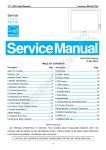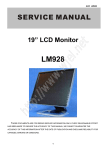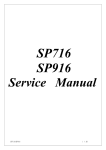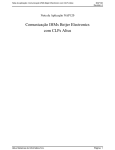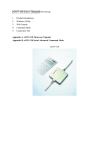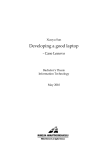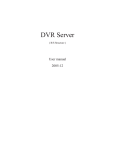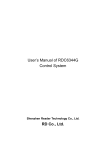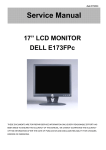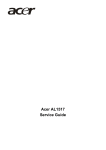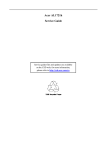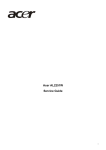Download Acer AL1715 Technical information
Transcript
Acer AL1715 Service Guide Service guide files and updates are available on the CSD web; for more information, please refer to http://csd.acer.com.tw Copyright Copyright © 2003 by Acer Incorporated. All rights reserved. No part of this publication may be reproduced, transmitted, transcribed, stored in a retrieval system, or translated into any language or computer language, in any form or by any means, electronic, mechanical, magnetic, optical, chemical, manual or otherwise, without the prior written permission of Acer Incorporated. Disclaimer The information in this guide is subject to change without notice. Acer Incorporated makes no representations or warranties, either expressed or implied, with respect to the contents hereof and specifically disclaims any warranties of merchantability or fitness for any particular purpose. Any Acer Incorporated software described in this manual is sold or licensed "as is". Should the programs prove defective following their purchase, the buyer (and not Acer Incorporated, its distributor, or its dealer) assumes the entire cost of all necessary servicing, repair, and any incidental or consequential damages resulting from any defect in the software. Acer is a registered trademark of Acer Corporation. Intel is a registered trademark of Intel Corporation. Pentium and Pentium II/III are trademarks of Intel Corporation. Other brand and product names are trademarks and/or registered trademarks of their respective holders. 1 Conventions The following conventions are used in this manual SCREEN MESSAGES NOTE WARNING CAUTION IMPORTANT Denotes actual messages that appear on screen. Gives bits and pieces of additional information related to the current topic. Alerts you to any damage that might result from doing or not doing specific actions. Gives precautionary measures to avoid possible hardware or software problems. Remind you to do specific actions relevant to the accomplishment of procedures. 2 Preface Before using this information and the product it supports, please read the following general information. 1. This Service Guide provides you with all technical information relating to the BASIC CONFIGURATION decided for Acer's "global" product offering. To better fit local market requirements and enhance product competitiveness, your regional office MAY have decided to extend the functionality of a machine (e.g. add-on card, modem, or extra memory capability). These LOCALIZED FEATURES will NOT be covered in this generic service guide. In such cases, please contact your regional offices or the responsible personnel/channel to provide you with further technical details. 2. Please note WHEN ORDERING FRU PARTS, that you should check the most up-to-date information available on your regional web or channel. If, for whatever reason, a part number change is made, it will not be noted in the printed Service Guide. For ACER-AUTHORIZED SERVICE PROVIDERS, your Acer office may have a DIFFERENT part number code to those given in the FRU list of this printed Service Guide. You MUST use the list provided by your regional Acer office to order FRU parts for repair and service of customer machines. 3 WARNING: (FOR FCC CERTIFIED MODELS) NOTE: This equipment has been tested and found to comply with the limits for a Class B digital device, pursuant to Part 15 of the FCC Rules. These limits are designed to provide reasonable protection against harmful interference in a residential installation. This equipment generates, uses and can radiate radio frequency energy, and if not installed and used in accordance with the instructions, may cause harmful interference to radio communications. However, there is no guarantee that interference will not occur in a particular installation. If this equipment does cause harmful interference to radio or television reception, which can be determined by turning the equipment off and on, the user is encouraged to try to correct the interference by one or more of the following measures: 1. Reorient or relocate the receiving antenna. 2. Increase the separation between the equipment and receiver. 3. Connect the equipment into an outlet on a circuit different from that to which the receiver is connected. 4. Consult the dealer or an experienced radio/TV technician for help. NOTICE: 1. The changes or modifications not expressly approved by the party responsible for compliance could void the user's authority to operate the equipment. 2. Shielded interface cables and AC power cord, if any, must be used in order to comply with the emission limits. 3. The manufacturer is not responsible for any radio or TV interference caused by unauthorized modification to this equipment. It is the responsibility of the user to correct such interference. As an ENERGY STAR® Partner our company has determined that this product meets the ENERGY STAR® guidelines for energy efficiency. WARNING: To prevent fire or shock hazard, do not expose the monitor to rain or moisture. Dangerously high voltages are present inside the monitor. Do not open the cabinet. Refer servicing to qualified personnel only. 4 PRECAUTIONS z Do not use the monitor near water, e.g. near a bathtub, washbowl, kitchen sink, laundry tub, swimming pool or in a wet basement. z Do not place the monitor on an unstable trolley, stand, or table. If the monitor falls, it can injure a person and cause serious damage to the appliance. Use only a trolley or stand recommended by the manufacturer or sold with the monitor. If you mount the monitor on a wall or shelf, use a mounting kit approved by the manufacturer and follow the kit instructions. z Slots and openings in the back and bottom of the cabinet are provided for ventilation. To ensure reliable operation of the monitor and to protect it from overheating, be sure these openings are not blocked or covered. Do not place the monitor on a bed, sofa, rug, or similar surface. Do not place the monitor near or over a radiator or heat register. Do not place the monitor in a bookcase or cabinet unless proper ventilation is provided. z The monitor should be operated only from the type of power source indicated on the label. If you are not sure of the type of power supplied to your home, consult your dealer or local power company. z The monitor is equipped with a three-pronged grounded plug, a plug with a third (grounding) pin. This plug will fit only into a grounded power outlet as a safety feature. If your outlet does not accommodate the three-wire plug, have an electrician install the correct outlet, or use an adapter to ground the appliance safely. Do not defeat the safety purpose of the grounded plug. zUnplug the unit during a lightning storm or when it will not be used for long periods of time. This will protect the monitor from damage due to power surges. z Do not overload power strips and extension cords. Overloading can result in fire or electric shock. z Never push any object into the slot on the monitor cabinet. It could short circuit parts causing a fire or electric shock. Never spill liquids on the monitor. z Do not attempt to service the monitor yourself; opening or removing covers can expose you to dangerous voltages and other hazards. Please refer all servicing to qualified service personnel z To ensure satisfactory operation, use the monitor only with UL listed computers which have appropriate configured receptacles marked between 100 - 240V AC, Min. 3.5A. z The wall socket shall be installed near the equipment and shall be easily accessible. z For use only with the attached power adapter (output 12V DC) which have UL, CSA listed license 5 SPECIAL NOTES ON LCD MONITORS The following symptoms are normal with LCD monitor and do not indicate a problem. NOTES • Due to the nature of the fluorescent light, the screen may flicker during initial use. Turn off the Power Switch and then turn it on again to make sure the flicker disappears. • You may find slightly uneven brightness on the screen depending on the desktop pattern you use. • The LCD screen has effective pixels of 99.99% or more. It may include blemishes of 0.01% or less such as a missing pixel or a pixel lit all of the time. • Due to the nature of the LCD screen, an afterimage of the previous screen may remain after switching the image, when the same image is displayed for hours. In this case, the screen is recovered slowly by changing the image or turning off the Power Switch for hours. 6 Table of Contents Chapter 1 Monitor Features ----------------------------------------------------------------- 6 Monitor Features --------------------------------------------------------------------------- 8 Factory Preset Timing Table -----------------------------------------------------------10 Block Diagram ------------------------------------------------------------------------------11 Main board Diagram ----------------------------------------------------------------------12 Software Flowchart ----------------------------------------------------------------------- 13 Main board Layout ------------------------------------------------------------------------ 15 Inverter Board Layout ---------------------------------------------------------------------17 Front Bezel ---------------------------------------------------------------------------- ------18 Rear Bezel -----------------------------------------------------------------------------------19 Chapter 2 Operating Instructions ----------------------------------------------------------- 20 External Controls ----------------------------------------------------------------------------20 Front Panel Controls -----------------------------------------------------------------------20 OSD Menu ------------------------------------------------------------------------------------22 Hot-Key Menu --------------------------------------------------------------------------------25 OSD Message --------------------------------------------------------------------------------26 LOGO -------------------------------------------------------------------------------------------27 Chapter 3 Machine Disassembly --------------------------------------------------------------28 Chapter 4 Troubleshooting --------------------------------------------------------------------- 31 Chapter 5 Connector Information ------------------------------------------------------------ 34 Chapter 6 FRU (Field Replacement Unit) List -------------------------------------------- 35 Exploded Diagram ---------------------------------------------------------------------------35 Chapter 7 Schematic Diagram ---------------------------------------------------------------- 40 Analog Input --------------------------------------------------------------------------------- 40 Input -------------------------------------------------------------------------------------------- 41 Scaler TSU16AK ---------------------------------------------------------------------------- 42 Panel Interface ------------------------------------------------------------------------------- 43 MCU -------------------------------------------------------------------------------------------- 44 Appendix Online Support Information ------------------------------------------------------ 45 7 Chapter 1 Monitor Features SAMSUNG Driving system TFT Color LCD Size 43.2cm(17.0") Pixel pitch 0.264mm(H) x 0.264mm(V) Brightness 300cd/m2 (Typical) Contrast 500:1(Typical) Viewable angle 150° (H) 135° (V) Response time 12ms LCD Panel R, G, B Analog Interface Video Input Digital (Dual-Input Model) H-Frequency 30KHz – 80KHz V-Frequency 55-75Hz Display Colors 16.2M Colors Dot Clock 135MHZ Max. Resolution 1280 x 1024 @75Hz Plug & Play VESA DDC1/2BTM EPA ENERGY STAR® ON Mode ≤45W OFF Mode ≤3W D-Sub 15pin Input Connector Input Video Signal DVI-D 24pin (Dual-Input Model) Analog:0.7Vp-p(standard),75 OHM, Positive Digital signal (Dual-Input Model) Horizontal: 337.92mm Maximum Screen Size Vertical: 270.34mm Power Source 100~264VAC,47~63HZ Environmental Considerations Operating Temp: 5° to 50°C Storage Temp: -20° to 65°C Operating Humidity: 10% to 85% Dimensions 430(W)×445(H)×152(D) mm Weight (N. W.) 4.2kg Unit (net) 8 External Controls Switch External Controls Functions • • • • • • • • • • • • • • • • • • • • • Auto Adjust Key </ Volume down (option) >/ Volume up (option) Power Button MENU/ Exit Contrast Brightness Focus Clock H.Position V.Position Language Input signal Selection Auto configuration (Analog model only) (Warm) Color (Cool) Color RGB Color temperature Reset OSD position /timeout Display information Exit Power Consumption (Maximum) 45 Watts Regulatory Compliance CUL, FCC, VCCI, CCC, MPRII, CE, TÜV/GS, CE, TCO’99, ISO13406-2 9 Factory Preset Timing Table 10 Monitor Block Diagram The LCD MONITOR contains a main board, an inverter/power board, keypad board and audio board which house the flat panel control logic, brightness control logic and DDC. The Inverter board will drive the backlight of panel. The Power will provide the 12V DC-power to inverter board and main board. Monitor Block Diagram POWER (90V-264V) LAMP PWPC AUDIO IN AUDIO DC-DC ANALOG IN LCD Controller DVI IN MCU SPEAKER LCD PANEL -Scaler -OSD -LVDS IC -ADC KEY BOARD 11 SPEAKER MAIN BOARD DIAGRAM VCC3.3V AT24C02 VCC2.5V VAA2 VAA1 VAA4 VAA3 (DDC) U301 PA 0~9 DDC SCL/SDA VGA R/G/B VGA Input PB 0~9 Panel VGA Hs / Vs U401 RXD/TXD TSU16AK VLCD U601 Winbond EPR SDA/SCL AT24C16 KEY Control 12 Software Flow Chart (1) (2) (3) (4) (5) Y N (6) (7) (8) Y N (9) (10) (11) (12) 13 1. Initialize MCU settings, including I/O, Timer, ISR and Serial Port settings. 2. Read EEPROM content to recover monitor settings, including brightness, contrast, color temperature and OSD position….etc. 3. Initialize system variable, including system flag, OSD timeout counter, burin mode status… etc. 4. Initialize OSD menu variable for user operation 5. Initialize device on the board, now only MST scaler chip will be initialized 6. Check if system is in power off status from first AC power up. If yes, then go to 7, else go to 8. 7. If yes, system will be forced to enter power off status 8. Mode detection 9. Check if input timing has been changed, if yes then go to 10, else go to 11 10. Setup MST scaler for display according input timing 11. OSD handler for OSD operation. 12. Debug handler, only debug only 14 Monitor Board Layout Item Description X401 CRYSTAL 14.318MHzHC-49U X601 20MHz U201 RT9164A18PG S0T-223 U202 AIC1084-33CM U301 M24C02-WMN6T SMT U401 TSU16AK pqfp-128 U601 W78E65P-40 CN201 HEADER 2*6P CN301 D-SUB 15PIN CN302 3 PIN CN503 PIN HEADER 24P 2.0mm CN601 PIN EADER CN602 WAFER 16PIN 2.0mm DIP RN601 CHIP AR 8P4R 10KOHM +-5 RN602 CHIP AR 8P4R 10KOHM +-5 15 Inverter Board Layout Item Description PT201 1.5MM RIVET PT202 1.5MM RIVET IC901 SG6841D BY SYSTEM IC902 PC123 Y82 IC903 HTL431 CN102 HEADER 2*6P CN201 WAFER CN202 WAFER CN203 CONN.2P R/A 87210-0236 DIP CN204 WAFER CN301 PHONE JACK(Only for SPK) CN302 3 PIN BD901 BRIDGE 2KBP06M NR901 8 OHM NCTR C905 100UF +-20% 400V T901 X'FMR Q211 2SC5706 DIP SANYO 16 Front Bezel Item Description 1 Auto Adjust Key/Exit 2 >/ Volume up (option) 3 </ Volume down (option) 4 MENU/ENTER 5 LED 6 POWER 17 Back Bezel Item Description 1 AC POWER CORD 2 Signal Cable 3 Audio Cable(Only for speaker) 4 DVI Cable (Only Dual-Input Mode) 18 Chapter 2 Operating Instructions Press the power button to turn the monitor on or off. The other control buttons are located at front panel of the monitor. By changing these settings, the picture can be adjusted to your personal preferences. • The power cord should be connected. • Connect the video cable from the monitor to the video card. • Press the power button to turn on the monitor position. The power indicator will light up. External Control Button EXTERNAL CONTROLS 1. Auto Adjust Key/Exit 4. MENU/ENTER 2. >/ Volume up (option) 5. LED 3. </ Volume down (option) 6. Power Key FRONT PANEL CONTROLS • Power Button: Press this button to turn the monitor ON or OFF. • MENU / ENTER: Activate OSD menu when OSD is OFF or activate/de-activate adjustment function when OSD is ON or Exit OSD menu when in Volume Adjust OSD status. • </ Volume down: Activates the volume control when the OSD is OFF or navigate through adjustment icons when OSD is ON or adjust a function when function is activated. 19 • >/ Volume up: Activates the volume control when the OSD is OFF or navigate through adjustment icons when OSD is ON or adjust a function when function is activated. • Auto Adjust button / Exit: 1. When OSD menu is in active status, this button will act as EXIT-KEY (Exit OSD menu). 2. When OSD menu is in off status, press this button for 2 seconds to activate the Auto Adjustment function. The Auto Adjustment function is used to set the H-Pos, V-Pos, Clock and Focus. • Power Indicator: Green —Power On mode. Orange— Power Off mode. NOTES NOTES • Do not install the monitor in a location near heat sources such as radiators or air ducts, or in a place subject to direct sunlight, or excessive dust or mechanical vibration or shock. • Save the original shipping carton and packing materials, as they will come in handy if you ever have to ship your monitor. • For maximum protection, repackage your monitor as it was originally packed at the factory. • To keep the monitor looking new, periodically clean it with a soft cloth. Stubborn stains may be removed with a cloth lightly dampened with a mild detergent solution. Never use strong solvents such as thinner, benzene, or abrasive cleaners, since these will damage the cabinet. As a safety precaution, always unplug the monitor before cleaning it. 20 OSD Menu 21 How to adjust a setting: 1. 2. 3. 4. Press the MENU-button to activate the OSD window. See figure 4. Press <or >to select the desired function. See figure 4. Press the MENU-button to select the function that you want to adjust. Press < or >to change the settings of the current function. 5. To exit and save, select the exit function. If you want to adjust any other function, repeat steps 2-4. The description for control function: Main Menu Icon Sub Menu Icon Sub Menu Item Description Contrast Contrast from Digital-register. Brightness Backlight Adjustment Focus Adjust Picture Phase to reduce Horizontal-Line noise Clock Adjust picture Clock to reduce Vertical-Line noise. H. Position Adjust the horizontal position of the picture. V. Position Adjust the vertical position of the picture. N/A Warm Recall Warm Color Temperature from EEPROM. N/A Cool Recall Cool Color Temperature from EEPROM. User / Red Red Gain from Digital-register. User / Green Green Gain Digital-register. User / Blue Blue Gain from Digital-register. N/A English Set OSD display language to English. N/A 繁體中文 Set OSD display language to Traditional Chinese. N/A Deutsch Set OSD display language to German. N/A 简体中文 Set OSD display language to Simplified Chinese. N/A 日本語 Set OSD display language to Japanese. H. Position Adjust the horizontal position of the OSD. V. Position Adjust the vertical position of the OSD. OSD Timeout Adjust the OSD timeout. 22 Main Menu Icon Sub Menu Icon Sub Menu Item Description N/A Auto Config N/A Analog Select input signal from analog (D-Sub) N/A Digital Select input signal from digital (DVI) N/A Information N/A Reset N/A Exit Auto Adjust the H/V Position, Focus and Clock of picture. (Only Analog-Input Model) (Only Dual-Input Mode) Show the resolution, H/V frequency and input port of current input timing. Clear each old status of Auto-configuration and set the color temperature to Cool. Exit OSD Hot-Key Menu The description for Hot-Key function: Item Operation Icon When the OSD is closed, press Left or Volume Right button will be Volume Hot-Key Description Volume of Audio adjustment. The Audio will be Mute when volume=0. Function 23 OSD Message The description for OSD Message: Item Auto Config Please Wait Input Not Supported Cable Not Connected Description 1.) When Analog signal input, if User Press Hot-Key “Auto”, will show this message, and the monitor do the auto config function. 2.) When Digital signal input, without this OSD Message. When the Hsync Frequency, Vsync Frequency or Resolution is out of the monitor support range, will show this message. This message will be flying. 1.) Analog-Only Model: When the video cable is not connected, will show this message. This message will be flying. 2.) Dual-Input Model: Dual-Input Model without this OSD Message. 1.) Analog-Only Model: When the video cable is connected, but there is no active signal input, No Signal will show this message, then enter power saving. 2.) Dual-Input Model: When the video cable is not connected, or the video cable is connected but there is no active signal input, will show this message, then enter power saving. LOGO When the monitor is power on, the LOGO will be showed in the center, and disappear slowly. 24 Chapter 3 Machine Disassembly This chapter contains step-by-step procedures on how to assemble the monitor for maintenance and troubleshooting. NOTE: 1.The screws for the different components vary in size. During the disassembly process, group the screws with the corresponding components to avoid mismatch when putting back the components. 2. Note: The monitor surface is susceptible to scratching! Therefore, lay the monitor on a soft surface when mounting or removing the base. 3.Wear gloves Picture Description To stick the insulated film on the mainframe and the shield Make preparation before putting the main 1 board: 1.insert the wiring harness 2.stick the soft cushion 2 To put the bezel on panel To fix the main frame and panel with the screws 25 Picture Description To put inverter board, and connect related interfaces To fix the board with screws To fix the wires with adhesive tape Connect Inverter board with Audio board To fix Audio board with screws To connect main board with Audio board To connect all other interfaces 26 To fix the main board with screws After having fix the board, cover the shield on them STRENGTH: In the end, cover the back bezel and connect above part with the chassis Warning: 1.In order to prevent the static disturbance, wear resisting static ring 2. No watch 27 Chapter 4 Trouble shooting This chapter provides troubleshooting information for the AL1715: Defect Mode Failure Analysis Repair Testing Missing Line Abnormal Display Bright Dot Dark Dot Light Leakage Mura Check Panel Panel Change Image Sticking Dot Defect Brightness Spot Dot Defect Particle No display Check Power Board Change Power Board Check Main board Change Main board Check Panel Change Panel Check Keyboard Change Keyboard Check Line Connected Power board and Mainborad Noise Change Wires Check Main board Change Main board Check Panel Change Panel Test NG A Next 28 Completed Defect Mode A Failure Analysis Repair Noise Check Single Cable Change Single Cable Flicker Check Main board Change Main board Check Panel Change Panel Check Main board Change Main board Check Panel Change Panel Check LVD Cable Change LVD Cable Check Single Cable Change Single Cable Check Main board Change Main board Check Panel Change Panel Check Power board Change Power board Check Main board Change Main board Check Keyboard Change Keyboard Check Single Cable Change Single Cable Check Main board Change Main board Check Main board Change Main board Abnormal Gray R\G\B Display Abnormal Monitor Shut Down No signal Power on Display Abnormal Next A Testing Test Completed 29 Defect Mode A Failure Analysis LED Display Abnormal Abnormal Keyboard Abnormal OSD Repair LED Off Change Keyboard or Mainboard or wire LED Dark Change Keyboard or Mainboard LED Abnormal Change Keyboard or Mainboard or wire LED Flicker Change Keyboard or Mainboard or wire Check Wires Change Wires Check Main board Change Main board Check Keyboard Change Keyboard Check Main board Change Main board Check LVDS Wire Change LVDS Wire Next Testing Test Completed 30 Chapter 5 Connector Information The following figure shows the connector locations on the monitor board: 31 Chapter 6 FRU (Field Replaceable Unit) List This chapter gives you the FRU (Field Replaceable Unit) listing in global configurations of Acer Altos AL1721.Refer to this chapter whenever ordering for parts to repair or for RMA (Return Merchandise Authorization). Please note that WHENORDERING FRU PARTS, you should check the most up-to-date information available on your regional web or channel. For whatever reasons a part number change is made, it will not be noted on the printed Service Guide. For ACER AUTHORIZED SERVICE PROVIDERS, your Acer office may have a DIFFERENT part number code from those given in the FRU list of this printed Service Guide. You MUST use the local FRU list provided by your regional Acer office to order FRU parts for repair and service of customer machines. NOTE: To scrap or to return the defective parts, you should follow the local government ordinance or regulations on how to dispose it properly, or follow the rules set by your regional Acer office on how to return it. Exploded Diagram 32 Note: above picture show the description of the following component No. Picture Description 1 Front Bezel 2 Main Frame 3 Back cover 4 Panel 33 5 No. Shield Picture Description Hinge cover 6 7 Stand base 8 Foot sticker 9 Inverter board 10 Mylar 34 Function board 11 12 No. Speaker (option) Picture Description 13 Main board 14 Audio Board (option) 15 Signal cable 16 Audio cable (option) 17 Power code 18 Inverter board cable 19 LVDS cable 35 20 Sponge 21 Mainframe screws No. Picture Description 22 Rear panel screws 23 Ground rush 24 Hinge cover screws Function 25 board screws 26 Main shield screws 27 D-sub screws 36 Chapter 7 Schematic Diagram INPUT R301 100 1/16W C304 0.047uF 0 1/16W R302 100 1/16W C305 0.047uF FB303 0 1/16W R303 100 1/16W C306 0.047uF R304 470 1/16W C307 0.001uF R305 100 1/16W C308 0.047uF R306 100 1/16W C309 0.047uF R307 100 1/16W C310 0.047uF PC5V R325 VGA_CON 75 1/16W 3 15 0 1/16W FB302 D301 BAV99 D302 BAV99 C301 NC C302 NC R327 75 1/16W 14 FB301 R326 75 1/16W 13 6 6 3 12 RXD TXD 3 CN301 DB15 1 6 2 7 3 8 4 9 5 10 11 C303 RIN 4 GIN 4 BIN 4 SOG 4 GNDR 4 NC D303 BAV99 GNDG 4 GNDB 4 VCC5V VCC5V VSI 150 OHM R312 100 1/16W R309 100 1/16W R310 150 1/16W R311 1K 1/16W VCC5V ST_DET1 6 HSYNC 4 PC5V VSYNC 4 1 1 2 1 2 FB304 10K 1/16W 2 HSI 1 2 R308 D304 BAT54C-GS08 D320 MLL5232B 5.6V R313 C311 R314 C312 2.2K 1/16W 33pF 10K 1/16W 220pF D317 MLL5232B 5.6V 3 D319 MLL5232B 5.6V R317 R318 10K 1/16W CLK_DDC DAT_DDC R315 R316 100 1/16W 100 1/16W CN302 1/3shield 2/4shield 0/5shield clk shield DAT0+ DAT0DAT1+ DAT1DAT2+ DAT2DAT3+ DAT3DAT4+ DAT4DAT5+ DAT5clk+ clkJACK NC 11 3 19 22 D321 MLL5232B 5.6V 6 6 R319 R320 100 1/16W NC 100 1/16W NC DVI5V D314 D315 D316 LL5232B 5.6V 5% NC LL5232B 5.6V 5% NC LL5232B 5.6V 5% NC R321 10K 1/16W NC 100 1/16W NC NC NC NC NC NC ST_DET2 6 C314 R323 0.1uF NC 10K 1/16W NC D306 D307 D308 D309 D310 D311 D312 D313 NC 0.1uF 1 DVI5V D305 BAT54C-GS08 NC R322 18 17 10 9 2 1 13 12 5 4 21 20 23 24 NC 1 2 3 4 DDC_DAT DDC_CLK VCC5V CLK_DDC2 DAT_DDC2 A0 A1 A2 GND AT24C02N-10SC D318 MLL5232B 5.6V 2 25 26 27 29 28 8 15 6 7 14 16 VCC WP SCL SDA 3 R G B RGB GND HSYNC VSYNC SYNC GND DDC SCL DDC SDA +5V HPD C313 U301 8 7 6 5 10K 1/16W NC 37 B+ BG+ GR+ R- 4 4 4 4 4 4 CLK+ CLK- 4 4 R324 10K 1/16W NC C315 U302 8 7 6 5 VCC WP SCL SDA A0 A1 A2 GND 1 2 3 4 AT24C02N-10SC NC 0.1uF NC SCALER TSU16AK VCC3.3 FB401 DEL 3 3 3 3 3 3 3 3 VDVI R+ RG+ GB+ BCLK+ CLKR403 390 1/16W C401 0.1uF 40 41 43 44 46 47 49 50 52 66 67 RIN0 RIN0M GIN0 GIN0M SOGIN0 BIN0 BIN0M HSYNC0 VSYNC0 DDC1_CLK/GPO8 DDC1_DAT/GPO7 VCC3.3 VPO VCC2.5 FB402 2 600 OHM C405 10uF/16V VDD VCC2.5 VDD 600 OHM C414 10uF/16V + LVA3P LVA3M LVACKP LVACKM LVA2P LVA2M LVA1P LVA1M LVA0P LVA0M C415C416C417C418 0.1uF0.1uF0.1uF0.1uF 102 103 106 107 108 109 110 111 112 113 PA0 PA1 PA2 PA3 PA4 PA5 PA6 PA7 PA8 PA9 VAA1 FB403 PA[0..9] PA[0..9] 5 2 VAA1 NC/LVB3P NC/LVB3M NC/LVBCKP NC/LVBCKM NC/LVB2P NC/LVB2M NC/LVB1P NC/LVB1M NC/LVB0P NC/LVB0M 118 119 120 121 122 123 124 125 128 1 PB0 PB1 PB2 PB3 PB4 PB5 PB6 PB7 PB8 PB9 VAD 600 OHM C419 10uF/16V R+ RG+ GB+ BCK+ CKREXT REFP + C406C407C408C409C410C411C412C413 0.1uF0.1uF0.1uF0.1uF0.1uF0.1uF0.1uF0.1uF 18 87 97 117 VDDC VDDC VDDC VDDC 11 21 84 94 104 114 126 53 VPO VDDP VDDP VDDP VDDP VDDP VDDP VDDP AVDD_PLL 45 51 35 AVDD AVDD 63 62 60 59 61 58 57 37 38 29 28 RIN GNDR GIN GNDG SOG BIN GNDB HSYNC VSYNC AVDD_DVI AVDD_DVI 3 3 3 3 3 3 3 3 3 VPLLVDVI VDPLL AVDD_MPLL U401 VAD 55 65 2 + C420C421 0.1uF0.1uF PB[0..9] PB[0..9] 5 VAA2 2 TSU16AK VAA2 FB404 VPLL 600 OHM C422 10uF/16V REFM + C423 0.1uF 6 CSZ 6 SCL 6 SDA 6 HWRESET 6 INT 69 71 70 32 72 CSZ SCL SDA HWRESETZ INT VAA3 VCC5V 2 VAA3 R407 R405 R404 R406 ADO/NC AD1/NC AD2/NC AD3/NC XIN 19 GNDC 86 GNDC 96 GNDC 116 GNDC GNDP GNDP GNDP GNDP GNDP GNDP GNDP 10 20 85 95 105 115 127 AVSS_DVI AVSS_DVI AVSS_DVI VDVI + C425C426 0.1uF0.1uF VCC3.3 AD0 AD1 AD2 AD3 6 6 6 6 R401 VAA4 NC 2 6 R402 4.7K 1/16W 39 42 48 AVSS_MPLL BUS TYPE/NC BYPASS AVSS_LPLL AVSS_PLL 3 2 54 0.1uF 36 C404 XOUT AVSS AVSS AVSS C403 22pF 34 68 56 64 14.318MHz 30 77 78 31 C424 10uF/16V 10K 1/16W 33 X401 10K 1/16W C402 22pF PWM0 PWM1 10K 1/16W AdjBACKLITE Volume 10K 1/16W 2 6 73 74 FB405 600 OHM VAA4 FB406 VDPLL 600 OHM C427 10uF/16V + C428 0.1uF Direct Bus 3-WIRE R401 R402 NC 4.7K 4.7K NC 38 PANEL INTERFACE 4 4 PA[0..9] PB[0..9] PA[0..9] PB[0..9] PA0 PA1 PA2 PA3 PA4 PA5 LVA3P LVA3M LVACKP LVACKM LVA2P LVA2M PA6 PA7 LVA1P LVA1M PA8 PA9 PB0 PB1 PB2 PB3 LVA0P LVA0M LVB3P LVB3M LVBCKP LVBCKM PB4 PB5 PB6 PB7 PB8 PB9 LVB2P LVB2M LVB1P LVB1M LVB0P LVB0M CN503 LVB0M LVB1M LVB2M LVBCKM LVB3M LVA0M LVA1M LVA2M LVACKM LVA3M RXO0RXO1RXO2RXOCRXO3RXE0RXE1RXE2RXECRXE3- 1 3 5 7 9 11 13 15 17 19 21 23 2 4 6 8 10 12 14 16 18 20 22 24 RXO0+ RXO1+ RXO2+ RXOC+ RXO3+ RXE0+ RXE1+ RXE2+ RXEC+ RXE3+ LVB0P LVB1P LVB2P LVBCKP LVB3P LVA0P LVA1P LVA2P LVACKP LVA3P CON24A R502 0 1/16W VLCD VLCD 39 2 C509 + C510 C511 22uF/16V 0.1uF 0.1uF MCU VCPU 4 3 2 1 4 3 2 1 2 VCPU R602 C601 10K 10K .1u RP601 RP602 10Kx4 10Kx4 10u/16V MAX810STR (NC) 20 2 10 D601 R603 1N4148 4 INT VCPU C605 .1u U602 1 2 3 4 A0 A1 A2 GND VCC WP SCL SDA 8 7 6 5 24C16 R638 R604 R605 10K 10K R639 NC R608 R609 100 100 2 3 4 5 6 7 8 9 0 R615 R614 XTAL2 RESET P1.0 P1.1 P1.2 P1.3 P1.4 P1.5 P1.6 P1.7 8051-PLCC 10K 10K 24 25 26 27 28 29 30 31 16 17 18 19 P2.0 P2.1 P2.2 P2.3 P2.4 P2.5 P2.6 P2.7 T0/P3.4 T1/P3.5 P3.6/WR P3.7/RD P4.3 INT0/P3.2 INT1/P3.3 ALE/P PSEN 13 11 P3.1/TXD P3.0/RXD VCC12V FB601 600 OHM VCC5V R627 R626 VCC5V 2,3,4 C612 0.1uF/16V 0.1uF/16V R625 R632 Standby Mute 10K 1/16W 10K 1/16W C613 CN603 VCPU 3 3 FB603 NC NC 100 100 AD0 AD1 AD2 AD3 4 4 4 4 DDC_DAT DDC_CLK TXD RXD 3 3 3 3 R612R613 2 OUT-R+ OUT-R- 10K R630 R633 Volume 600 OHM NC 10K 10K ST_DET1 ST_DET2 10K 1/16W 1 2 3 4 R631 DVI-DSUB SELECT Mute_key 0 0 C614 C615 NC NC 4 VCPU VCPU VCPU C611 R628 1uF/16V R617 R618 470 470 470 Q603 Q602 E CON14A 10K 10K R610 R611 R634 R635 E OUT-L+ OUT-L- FB602 600 OHM 2 4 6 8 10 12 14 R606 R607 HWRESET 4 onPANEL_5V/3.3V 2 onBACKLITE 2 CSZ 4 SCL 4 SDA 4 VCPU VCPU VCC12V R616 4.7KB LED_G B Q601 CN602 PMBS3906 C CN601 1 3 5 7 9 11 13 POWER ENTER RIGHT LEFT AUTO LED_B LED_O LED_G AUTO R620 RIGHT R622 POWER R624 DVI-DSUB SELECT LED_GRN 0 0 0 C606 C608 C610 NC NC NC OUT-L+ OUT-L- 1 3 5 7 9 11 13 15 4.7K LED_B B PMBS3906 2 4 6 8 10 12 14 16 LED_BLUE LED_ORANGE PMBS3906 R621 R623 Mute_key OUT-R+ OUT-R- C607 NC CON16A 40 R629 E Reset Circuit 10K 12 14 15 33 32 43 42 41 40 39 38 37 36 P0.0 P0.1 P0.2 P0.3 P0.4 P0.5 P0.6 P0.7 XTAL1 C RST 1 VCC GND C604 22pF 3 EA/VP C U603 21 VSS VCPU 35 11.0592MHZ 22 Y601 C603 U601 VCC C602 22pF 44 5 6 7 8 5 6 7 8 R601 C609 NC 0 0 ENTER LEFT R619 4.7K LED_O Appendix Online Support Information This section describes online technical support services available to help you repair your Acer Systems. If you are a distributor, dealer, ASP or TPM, please refer your technical queries to your local Acer branch office. Acer Branch Offices and Regional Business Units may access our website. However some sources will require a user i.d. and password. These can be obtained directly from Acer CSD Taiwan. Acer's Website offers you convenient and valuable support resources whenever you need them. In the Technical Information section you can download information on all of Acer's Notebook, Desktop Server models including: Service guides User's manuals Training materials Bios updates Spare parts lists TABs (Technical Announcement Bulletin) For these purposes, we have included an Acrobat File to facilitate the problem-free downloading of technical material. Also contained on this website are: Detailed information on Acer's International Traveler's Warranty (ITW) Returned material authorization procedures An overview of all the support services we offer, accompanied by a list of telephone, fax contacts for all your technical queries. We are always looking for ways to optimize and improve our services, so if you have any suggestions comments, please do not hesitate to communicate these to us. 41











































